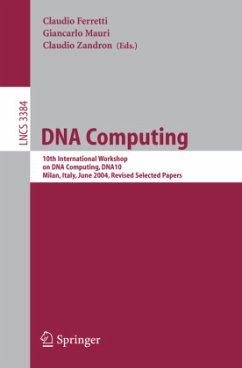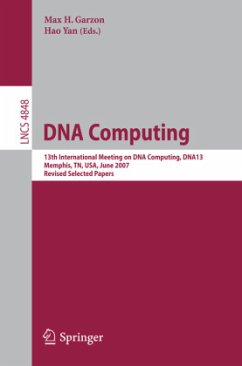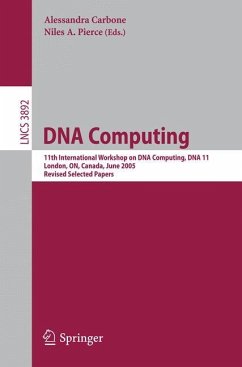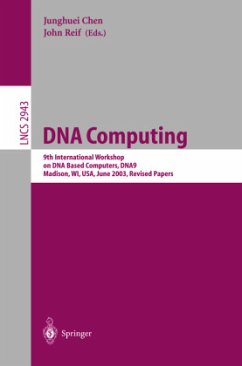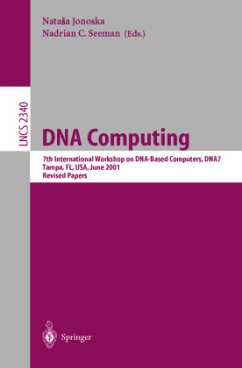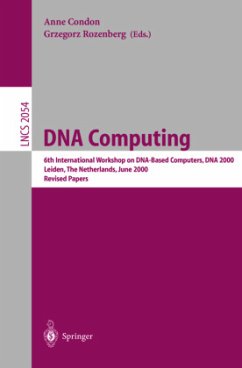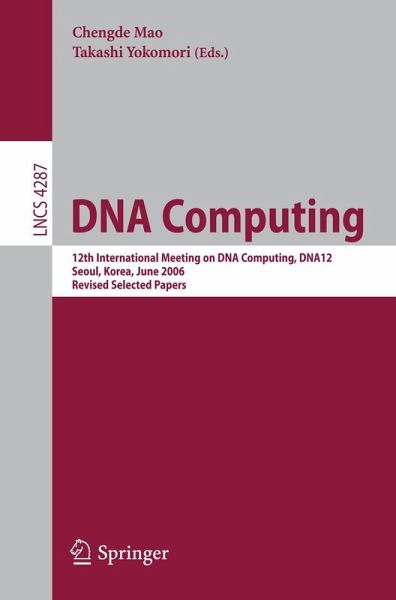
DNA Computing
12th International Meeting on DNA Computing, DNA12, Seoul, Korea, June 5-9, 2006, Revised Selected Papers
Herausgegeben: Mao, Chengde; Yokomori, Takashi

PAYBACK Punkte
20 °P sammeln!
Molecular and Membrane Computing Models.- Computing with Spiking Neural P Systems: Traces and Small Universal Systems.- Minimal Parallelism for Polarizationless P Systems.- P Systems with Active Membranes Characterize PSPACE.- All NP-Problems Can Be Solved in Polynomial Time by Accepting Networks of Splicing Processors of Constant Size.- Length-Separating Test Tube Systems.- Gene Assembly Algorithms for Ciliates.- Complexity Analysis.- Spectrum of a Pot for DNA Complexes.- On the Complexity of Graph Self-assembly in Accretive Systems.- Viral Genome Compression.- Sequence and Tile Designs and T...
Molecular and Membrane Computing Models.- Computing with Spiking Neural P Systems: Traces and Small Universal Systems.- Minimal Parallelism for Polarizationless P Systems.- P Systems with Active Membranes Characterize PSPACE.- All NP-Problems Can Be Solved in Polynomial Time by Accepting Networks of Splicing Processors of Constant Size.- Length-Separating Test Tube Systems.- Gene Assembly Algorithms for Ciliates.- Complexity Analysis.- Spectrum of a Pot for DNA Complexes.- On the Complexity of Graph Self-assembly in Accretive Systems.- Viral Genome Compression.- Sequence and Tile Designs and Their Properties.- DNA Codes and Their Properties.- In Search of Optimal Codes for DNA Computing.- DNA Sequence Design by Dynamic Neighborhood Searches.- Sequence Design for Stable DNA Tiles.- Hairpin Structures Defined by DNA Trajectories.- DNA Tile Self-assembly Models.- Design and Simulation of Self-repairing DNA Lattices.- On Times to Compute Shapes in 2D Tile Self-assembly.- Capabilities and Limits of Compact Error Resilience Methods for Algorithmic Self-assembly in Two and Three Dimensions.- A Mathematical Approach to Cross-Linked Structures in Viral Capsids: Predicting the Architecture of Novel Containers for Drug Delivery.- Simulator and Software for DNA Computing.- A Framework for Modeling DNA Based Molecular Systems.- Uniquimer: A de Novo DNA Sequence Generation Computer Software for DNA Self-assembly.- A Probabilistic Model of the DNA Conformational Change.- Simulations of Microreactors: The Order of Things.- DNA Computing Algorithms and New Applications.- DNA Hypernetworks for Information Storage and Retrieval.- Abstraction Layers for Scalable Microfluidic Biocomputers.- Fuzzy Forecasting with DNA Computing.- "Reasoning" and "Talking" DNA: Can DNA UnderstandEnglish?.- Novel Experimental Approaches.- A New Readout Approach in DNA Computing Based on Real-Time PCR with TaqMan Probes.- Automating the DNA Computer: Solving n-Variable 3-SAT Problems.- Local Area Manipulation of DNA Molecules for Photonic DNA Memory.- Experimental Solutions.- Unravel Four Hairpins!.- Displacement Whiplash PCR: Optimized Architecture and Experimental Validation.- MethyLogic: Implementation of Boolean Logic Using DNA Methylation.- Development of DNA Relational Database and Data Manipulation Experiments.- Experimental Validation of the Statistical Thermodynamic Model for Prediction of the Behavior of Autonomous Molecular Computers Based on DNA Hairpin Formation.



